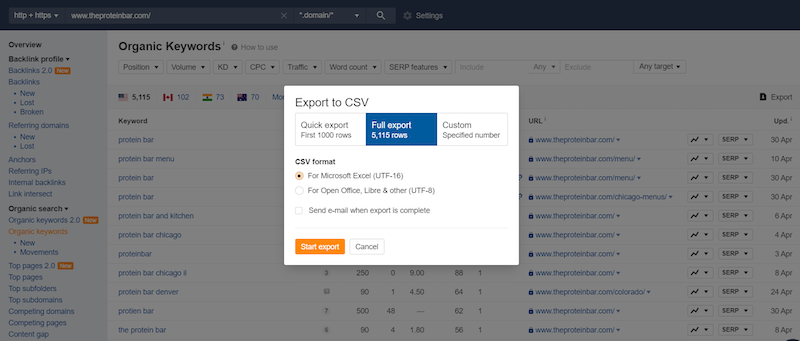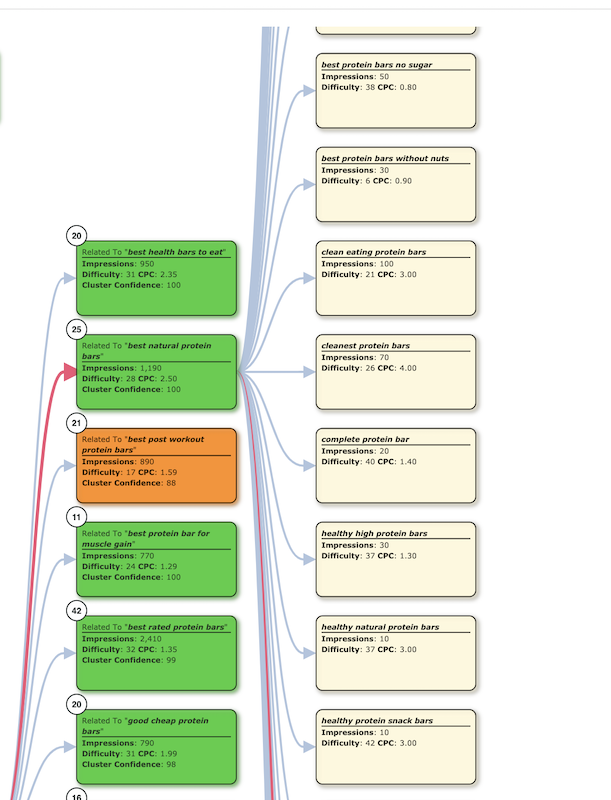Table Of Contents:
Contemplating which next-gen gaming console to buy?
PS5 or Xbox series X? Tough times.
Or looking for a keyword grouping tool to make your life easier?
Everything’s a search away.
We live in a world where pretty much every online experience starts with a search.
And behind every search is A KEYWORD!
Whether you are a small business catering to your local audience or a massive online retailer selling merch worldwide you need to know what your customers are typing into the search box to find you online.
Ah the elusive keyword research.
One of the most important things you need to do when starting your SEO journey.
Honestly.
If you think I’m going to tell you that keywords are not important.
Think again.
But the way keyword research is being done is not relevant anymore.
Although Google processes trillions of searches every year, still, 15% of those queries have never been seen by Google before.
Can you imagine the potential?
Alas, some people still live in 2017.
They think if their target keyword is not stuffed in every possible place on a page then it’s not working.
While some people accept it’s 2021.
BERT is here.
NLP is here.
Core Web Vitals are a thing.
Passage indexing has entered the chat.
Yes, search is changing.
It already has.
And if people are sleeping on it then it’s no wonder why everyone is complaining about ranking drops and "SEO being dead".
It’s not dead.
But it’s not what it used to be either.
Disclaimer: this is not your standard keyword research guide that tells you to go brainstorm keyword ideas or go to X tool, look for X metrics and export 5 keywords.
I’m going to try and explain how to do initial keyword research for the content clustering strategy.
Moreover, I’d like to dive deep into the keyword research file you need to have to use Keyword Cupid to its max potential.
Let’s dive in!
How Google Search Works
Google search has changed a lot in the past few years if you haven’t noticed.No more totally off results pages.
No more unnatural 2-word searches.
Complex queries a.k.a. very long-term keywords are not an issue for Google anymore.
After the BERT update the way it processes queries has gotten a lot quicker and a lot more accurate.

(But has it?
This is a very controversial topic so I’m not going to make any claim here, but lately, the SERPs have been looking a bit strange.
Is Google purposely burying good search results in favor of those that make him money?
Dunno...)
Now it can understand the contextual relationship between the words of each query which makes typing in long questions more natural.
This leads me to my next point.
You can never predict what your target customers are going to type in and believe me optimizing your page for 3 keywords is not predicting search behavior.
So how do you actually prep for all of those random searches?
By creating contextual topic clusters.
If you have comprehensive information on a certain topic, chances are you can rank for hundreds if not thousands of search terms you never knew existed because you have all the information on said topic users can ever need.
Meaning whatever they type in your content will pop up even if you have never, even once, used that exact keyword in your content.
It’s all about contextual relevance.
It’s safe to say this doesn’t go unnoticed by Google.
As we all very well know, "G" has one goal when it comes to organic search:
to provide the most accurate info to its users.
(Or does it? Kidding!)
Identify Topics
Before diving headfirst into collecting all the keywords you can think of let’s have a look at your website and its goal.- What kind of niche is your website in?
- What kind of services/products are you offering?
- What’s your content strategy right now?
- What’s your ultimate goal when it comes to your content?
- Why am I asking so many questions?
Because contrary to popular belief keyword research does not start and end inside of an automated tool.
We humans need to accept one fact:
Automated tools do not work as the human brain does.
Not yet anyway.
You need to factor in a lot more than just the suggestions Semrush or Ahrefs give to you.
So when it comes to conducting keyword research for topic clusters the first step is NOT the keywords.
First, you need to identify the overachieving themes you want to cover.
Say you have a website that offers SEO courses for all types of people.
What are some of the core topics going to be?
Technical SEO?
Link Building?
Keyword Research?
YES! And many more.
Basically, you need to identify the core topics that you want your audience to know you for so that we can move on to the next step.
Truthfully when it comes to e-commerce websites this part can be a bit tricky as you might have hundreds of items which can get confusing.
But even within countless products, most e-commerces (not talking about Amazon or Etsy) serve a particular niche which makes the task at hand more specific.
What I mean is you might have an online store that sells protein bars and other supplements.
Seems tricky? Not quite.
Who is your target audience?
- Athletes
- Bodybuilders
- Fitness Enthusiasts
- People who lead a healthy lifestyle
- People who want to lose/gain weight
- etc.
Your target audience can tell you a lot more about what you need to do than you might think.
You basically have your topic clusters laid out right there.
The only thing left to do is the actual keyword research and mapping keywords to each topic.
I’ve written an extensive piece on keyword clustering so go over there to check it out.
Keyword Research for Keyword Cupid
Now that the topics are identified it’s time to start with the actual keyword research.If you are new to Keyword Cupid.
Welcome! How are you doing?
I think you have a few questions that need to be answered first so head over to the ultimate Keyword Cupid guide where you can find a detailed breakdown on everything cupid.
Current users welcome back! I know there’s a bit of confusion around what keywords to run the KC report on.
Honestly, I was a bit confused at first too.
The simple answer is:
The more the better.
The long answer is:Create separate research files for each topic (or multiple topics, depending on their volume) you intend to create the clusters around while making sure to include as many relevant keywords as possible for the most accurate clustering results.
The short and sweet answer has led a lot of people, including myself, to believe it’s better to gather ALL of your target and ranking keywords and put them in the report.Do you see where this can do wrong?
Normally a keyword research file contains keywords for every single page on a website which we don’t need for clustering and it contains way fewer keywords than preferred.
Let me explain.
A standard keyword research file has 5-15 (sometimes 2-5) target keywords for each page while making absolutely sure that said keywords have high search volume, moderate keyword difficulty and low to average CPC.
And being an SEO this is exactly how I do it too, so I’m not saying it’s wrong.
But this is not your standard keyword research file.
We are looking at themes/overall topics, not single pages.
Meaning your 5000-keyword file is going to be dedicated to one topic. But it doesn’t necessarily have to be.
You can very well combine all of your topics together and run the report for the whole strategy.
It all depends on the broadness of each topic and the number of core topics you have.
Interesting, right?
The question is how do we find so many keywords?
Research time!
Competitor Keyword Research
When it comes to creating the keyword file for KC, I’d recommend using competitor keyword research instead of relying on all the tools to give you suggestions.The thing with most tools is that they collect data NOT straight from Google:
- SEMRush uses an algorithm to estimate their traffic.
- Ahrefs uses a third party to get clickstream data and pairs it with data from Google.
- MOZ uses a third party to get their Google data and clickstream data.
- KWFinder reports that their data is the same as Google Keyword Planner.
https://www.twinword.com/blog/where-do-keyword-research-tools-get-google-search-volume-data-and-keyword-statistics/
Therefore there is no telling if the data we get from those tools is even accurate enough to base decisions on.
But when you look at your competitor’s ranking keywords the accuracy is a bit higher. Hopefully.
How do I know that you ask?
Because Google is showing your competitor’s result for a number of thematically-related queries, meaning G finds it relevant for these searches.
So intend of relying on "random" suggestions from a tool, you can listen to Google and gather all of your keywords while "spying" on the competition.
Two birds one stone and all that.
Whichever keyword research tool you decide to use is completely up to you but I prefer Semrush or Ahrefs when it comes to checking on my competitors.
Simply do thorough research and find all of your competitors that have a similar content structure or simply a strong content game.
Look for brands that are dominating the SERPs for the majority of related queries on your target topics. One article won’t cut it.
Go to Keyword Explorer(Ahrefs) or Keyword Overview(Semrush) and pop your seed keyword into the search box.
Let’s go with the example of the protein bars above.

Scroll down to the SERP overview breakdown and start analyzing.

I’d recommend taking into consideration the DR of each result you see here. Most websites on this list are DR70+ websites, including Amazon and Twitter no less.
Understandably these are not your competitors and there’s no point in regarding them as such because their domain authority speaks for themselves and they are not even in the same niche.
Then we have 2 search results with average DR, moreover one of them is ranking no 1. That’s huge for such a competitive term.
Meaning if a smaller website can do it you can too. (Although said website has thousands of backlinks so it’s not as effortless as it looks)
After identifying a few good competitors you can start exporting your competitors’ ranking keywords and adding them to a sheet for filtering.

And don’t forget yourself. Run a search on your own website and export all of your ranking keywords and add them to the sheet along with the competitors.
I suggest using the same tool in order to keep the metrics intact but you can easily use GSC.
Pro Tip: If you are still thinking of going the manual route, check out the parent topic column in Ahrefs.
It determines if you can rank for your target keyword while targeting a more general topic on your page instead. Very useful, a bit limited but still worth a try.

How to Filter and Structure the Keyword Research File
Now the boring part.Once you have everything uploaded into the same sheet, it’s time to do some clean-up.
First, get rid of duplicate and branded keywords as you for sure do not need them. (Use Google Sheet’s filtering magic to get this done)
You can remove any other unnecessary keywords such as domain names, irrelevant search terms that you do not intend to target.
Depending on your content marketing goals you can filter the list by ‘best’, ‘how to’, buyer keywords that have different intent.
Another important thing to consider is the ranking tab.
You can filter out any irrelevant search terms by eliminating keywords your competitor is ranking for on the third page and beyond.
To be on the safe side you can remove only low search volume keywords. Just saying. We don’t want any lost opportunities, you know.
Other than that you are not going to filter the keyword list.
Shocking I know.
I’m talking about the search volume.
There is more potential in 0 search volume keywords than those with 10000 searches per month.
Why?
Except the obvious being it’s very hard to rank for super competitive terms especially if your website is new, those low search volume keywords can bring you more search visibility than bigger terms.
Plus as you can see these tools are not 100% accurate.
Search volume, keyword difficulty, CPC: these are just vanity metrics specific to a certain tool and its existing data.
So take everything with a grain of salt.
I’m in no way saying it’s impossible to rank for high search volume competitive terms.
Of course, it’s possible. It just takes a lot of effort and I don’t mean just frontloading it in your title and sprinkling a few in your copy.
While focusing on broader keywords and naturally fitting them into your content can be a lot more beneficial.
Honestly, as a content creator who writes optimized content, I can surely tell you there is no way you are going to not include those head terms in your content.
It’s pretty much inevitable if you let yourself write in a natural language.
Anyways the point was there is no need to filter all of those search terms so harshly.
You might think why do we need so many keywords though?
Yes, some topics are quite broad but thousands of keywords?
I was a bit confused here too, to be honest with you.
When we think of keywords we think of narrow targets but as I’ve mentioned already that’s in the past.
With Keyword Cupid each missed keyword however small or big can change up the structure of your silo.

This is what I mean.
If you run a report with 100 keywords that represent an average-sized topic, chances are the report won’t give you as much useful data.
Because it will cluster together subtopics that should’ve been separate entities but can’t be because you haven’t given the tool any other keywords to support that subtopic.
On the contrary, if you import too many synonyms or identical keywords it can create separate clusters that should’ve been grouped into one to begin with.
The idea is to find that happy middle that looks different for different people.
Just trust the process.
It pays off big time!
Don’t take me for my word, check out our amazing case studies and see for yourself.
Final Words
That was pretty much it.I hope you found it useful and helpful.
Please keep in mind these are just a recommendation based on my own experience with the tool and what’s been working for a lot of people who have been using Keyword Cupid.
There is not a cookie-cutter way to do this, and if you have found an alternative approach we would love to hear it.
Comment down below or join our FB group and share your experience.
If you have any remaining questions please feel free to drop us a line and we’ll make sure to clear things up as soon as possible.
In the meantime have a great week and see you in the next one.
Cheers!








